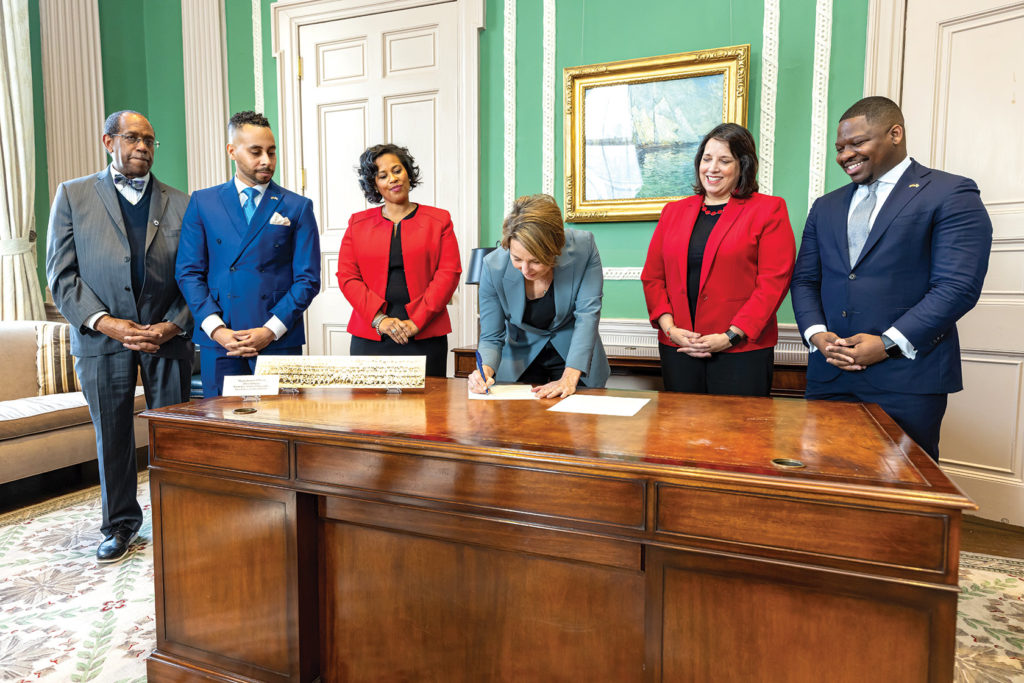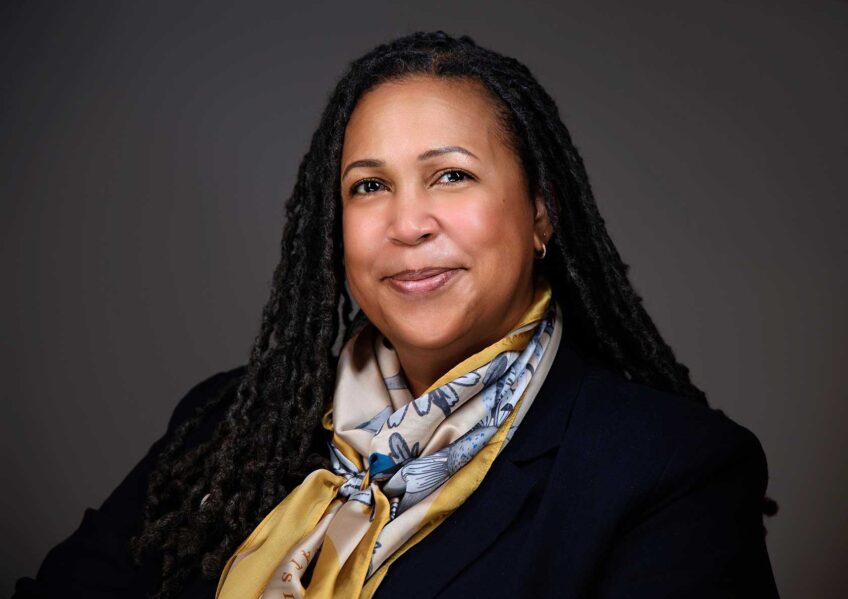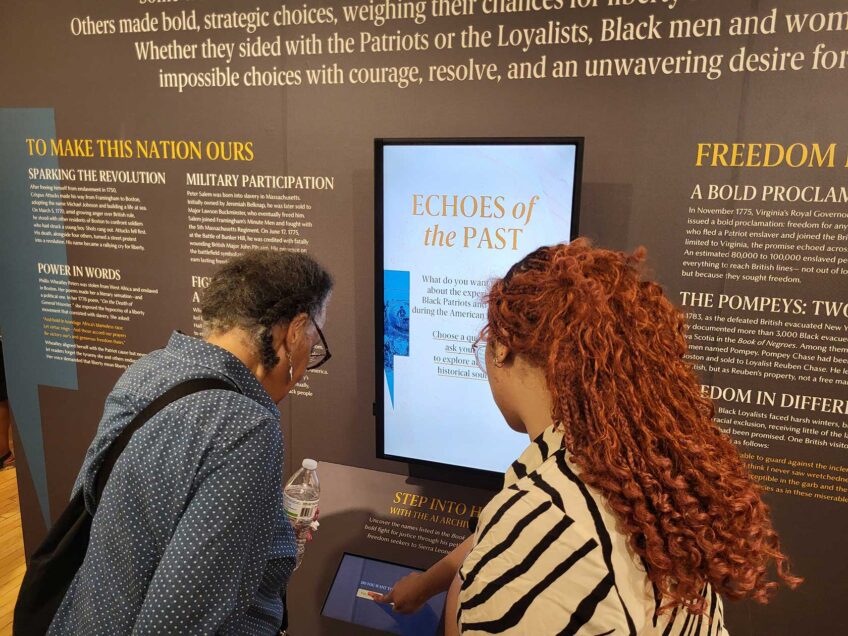Governor forms advisory council
Members will advise on Blacks’ economic prosperity, well-being

Massachusetts Governor Maura Healey has signed an executive order creating a new Governor’s Advisory Council on Black Empowerment, to which Healey has appointed more than 30 members, tasked with advising the governor “on issues related to the economic prosperity and well-being of Massachusetts’ Black community, including education, health care, housing and workforce development.”
Appointed as chair of the Council is Tanisha Sullivan, president of the NAACP Boston Branch, and, as vice-chair, Tony Richards II, vice president of equitable business development at the Massachusetts Housing Finance Agency.
The new body is not the first of its kind. In 2017, former Governor Charlie Baker created and appointed members to a Black Advisory Commission, similarly tasked with advising the governor on issues of import and urgency to Black communities across Massachusetts. Sullivan served on Baker’s commission, as did Richards.
Speaking with the Banner, Sullivan expressed hope that this new advisory body will be able to break new ground.
“We’re very familiar with what was, and as a result of that familiarity, we have a very good sense of what worked, where there was impact and some of the things that we need to do differently this go-round to ensure even greater impact,” Sullivan said.

Advisory Council on Black Empowerment Chair Tanisha Sullivan speaks during a press conference as Gov. Maura Healey and Lt. Gov. Kim Driscoll look on. PHOTO: JOSHUA QUALLS, GOVERNOR’S OFFICE
“What I’m deeply appreciative of is that the governor, in creating this particular council, was very intentional about giving us the autonomy to be able to identify the issues where we believe we can do some systems-level work in order to have a significant impact,” Sullivan said, “and also giving us the authority to be able to bring additional expertise around the table should it be needed.”
Sullivan said the first step for the Council will be a series of public listening sessions, beginning this April. From there, the Council will home in on specific issues of immediate importance and eventually produce a set of recommendations for action to Healey.
From there, Sullivan emphasized, the onus will be upon the governor to implement those recommendations.
“I want to make clear that we are in an advisory role. We do not work for the state. We do not work for the governor,” Sullivan said. “Ultimately, it will be the governor and her cabinet that determines what they are going to advance.”
Observers who spoke with the Banner expressed cautious optimism about the new body, noting that similar bodies created in the past have had mixed results.
“There’s been a lot of commissions like this over the years,” noted James Jennings, professor emeritus of urban and environmental policy and planning at Tufts University.
“These kinds of commissions, advisory groups, I think can play an important role in raising certain kinds of issues,” said Jennings, noting that he believes the context for conversations about Black issues has changed in recent years — not least since the impact on Black communities of the COVID-19 pandemic.
“Before COVID-19, in some circles people would say, sort of, ‘What else is new?’” Jennings said.
“I think the [Council] has the opportunity to really educate the general public about not only the extent of racial inequality and inequality in Massachusetts, but also its history and why it’s harmful not to address it — so I think the context is a little bit different, and I’m hopeful about that.”
To be successful, Jennings said, the new advisory council should not just make eventual recommendations for policy.
“It has to consider who or what will be doing the implementation of those recommendations, and who or what will be monitoring the implementation of such recommendations — and those are two questions that I don’t recall past commissions really taking on,” he said.
Jennings adds that Healey’s own role will be critical in the determining how robust and effective the new Council can be.
“Governor Healey will have a challenge and responsibility to let Massachusetts know that this commission is serious business … the governor’s voice will be really critical in giving the [Council] legitimacy.”
Rachel Kemp, a vice president at the investment firm Pickwick Capital Partners and a former assistant secretary for economic affairs under the administration of former governors William Weld and Paul Cellucci, agrees that legitimacy is key to the new Council’s success.
“These commissions and councils, they should not be window dressing to address constituencies of color — we’re too mature for that, and we’re too smart for that,” Kemp told the Banner.
The Council, Kemp said, should have a real policymaking role.
“How do we take suggestions and turn that into an executable piece of policy? Because that’s what’s missing,” she said.
State Sen. Lydia Edwards said she is pleased to see the new Council and its membership.
“I see a collection of really great minds and great hearts in the room, and I’m very excited for them to get to work,” Edwards told the Banner. “I really do think it’s important, though, that we all recognize that not everything that they’re going to have to say is going to be happy and exciting and good news.”
But, said Edwards, “I trust this Council won’t just end the sentence, end the conversation, with what’s not going well. I think that they will absolutely suggest several things we could do to help undo past wrongs and also course-correct to prevent future wrongs.”
Edwards added, “We know about the disparities, we know about the wealth gap. It’s not enough to collect all of these things that we already know. We need a whole list of solutions and suggestions that help us resolve the issues.”






